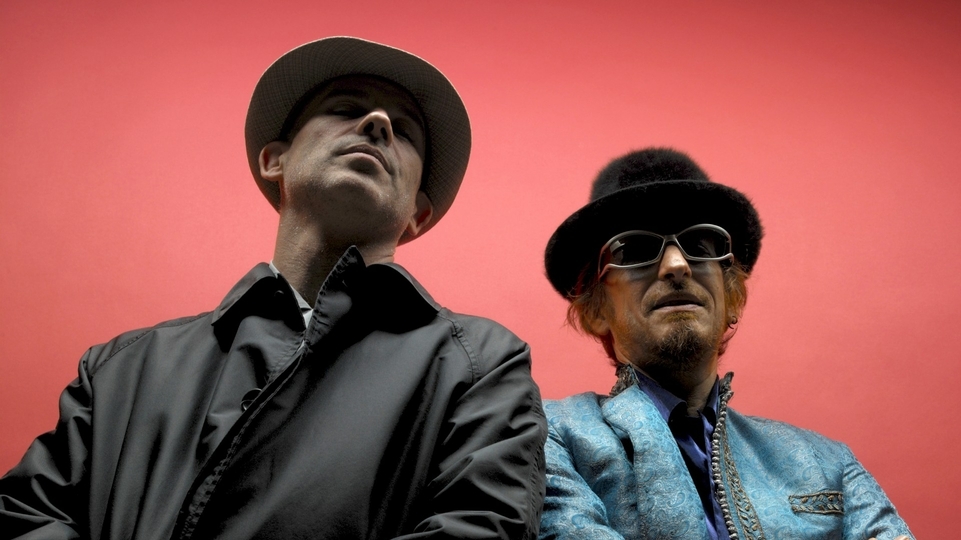Best Of British Outstanding Contribution: Coldcut
They’re next-level DJs, VJs, label owners, sample freaks, activists, punky instigators and pioneering software developers, and DJ Mag is awarding them the Outstanding Contribution gong for 30 years on the cutting edge of electronic music. They are, of course, Matt Black and Jonathan More, aka Coldcut...

Coldcut are true innovators. To do justice to their history would take a whole book, but in a nutshell the world of electronic music would be a much less colourful, clever and creative place without their inspirational ideas.
They met each other 30 years ago in Reckless Records in Soho. Matt had a background in computers — he’d built his own synth as a schoolboy — but was also big into music and started DJing while at school. Jonathan, meanwhile, had been to art college and
was an influential DJ on the rare groove scene, and they immediately bonded over a shared love of hip-hop and the cut & paste techniques of Double D & Steinski. Matt had made a sampladelic tape using the pause button on a cassette deck, and they decided to combine forces. ‘Say Kids What Time Is It?’ was the first fruit of their labours, mashing up bits of ‘King Of The Swingers’ from The Jungle Book with ‘Funky Drummer’ James Brown and other choice samples into a funky party jam.
The first Coldcut record took off and soon they were producing their ‘Seven Minutes Of Madness’ remix of Eric B & Rakim, which helped hip-hop move into wider consciousness in the UK. They played seminal acid house club Shoom in ’88, and started making more housey tunes such as ‘Doctorin’ The House’, which mixed different sounds from assorted styles — acid house, reggae etc — into a groovy montage. “We were children of John Peel, who made being into lots of different styles of music cool,” says Matt, “and then the New York hip-hop and Double D & Steinski style of mixing let us literally mix a lot of different influences together.”
After teaming up with vocalist Yazz, they had a UK No.1 and were suddenly catapulted into the mainstream. “Square peg, round hole,” says Jonathan, “we were an uncomfortable fit in some respects.”
Inspired by trips to Japan, they started their own label — Ninja Tune —and when their major label deal turned sour they continued to still release music under various pseudonyms and pump it out through Ninja.
Parallel to this, they also started a multimedia video company in the early ‘90s too — Hex. “People are interested in visuals, we were already magpies of visual samples,” says Matt. “Visuals also took the attention away from us, we didn’t have to be frontmen in the conventional way.”
Early adopters of the internet in the early ‘90s, they started doing ‘netcasts’ — live streams — before most people from Boiler Room were born, and set up a pirate TV station. They made the super-eclectic ‘Seventy Minutes Of Madness’ Journeys By DJ mix comp that’s still revered as one of the best ever today, and developed audio-visual software VJamm, which led to them producing environmentally-conscious AV classic ’Timber’, offsetting a buzzing chainsaw with a beautiful vocal from a native tribeswoman — the visuals and audio synced in perfect harmony.
The guys talk about video sampling being the next step for the sample freak, and yet Coldcut democratised the multi-media ‘play tools’ they developed — usually giving them away for free to help others in their creative exploits. “It became fair to share it back,” says Matt, modestly. “That creative commons open-source mentality is something we support.”
As the ‘90s stretched out, Ninja signed a bunch of great artists — Roots Manuva, Mr Scruff, Funki Porcini, The Herbaliser and so on — and then in the noughties cats such as Bonobo and J.Swinscoe (Cinematic Orchestra), who after a few years of nurturing on the label were playing gigs at the Royal Albert Hall.
Ninja now employs over 60 people — it’s a super-professional operation. “A lot of Ninja’s success is down to Pete Quick, he’s built up a tribe of people who are all passionate music-heads and taken care of the business,” Matt explains, talking about the Ninja philosophy of “fairness, decency and openness” — and the fact that it is artist-led — being key to its success.
The label has recently brought 4/4 acts like Bicep, Tiga and Helena Hauff onto the label, but Matt points out that the first release on Ninja was a house record — ‘Zen Brakes’. “But as house dominated and became the McDance, McThud monoculture, we reacted against it and in a way Ninja was the alternative — saying, ‘Hey, there is other life out here other than house music,” he says. “But we always loved house as well.”
Making Ninja into a viable concern has given Coldcut the freedom to keep experimenting as artists, and in the last 12 months they’ve put out over 30 tracks — including an album with On-U Sound dubmeister Adrian Sherwood, a long-time associate. “We just want to make enough money to keep on doing what we’re doing,” says Matt. Check some of their free toys on coldcut.net